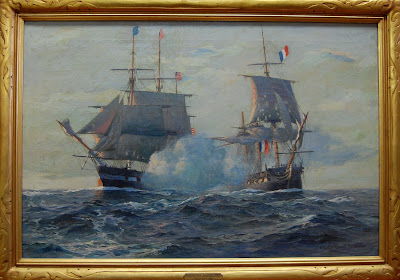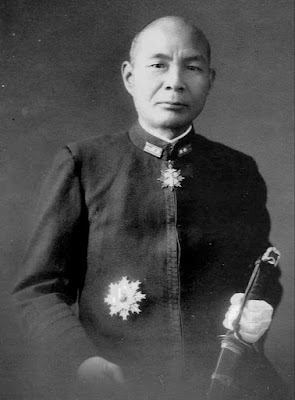Eyewitness to the attack on Pearl Harbor
 |
Sketch of attack on Pearl Harbor from USS Swan
Gift of Mrs. Buren B. Wilkie through the Naval War College
Foundation
NWCM.1987.29.01
|
Seaman Second Class Blaine N. Seeley was serving in the seaplane tender USS Swan (AVP-7) on the morning of 7 December 1941. This drawing, which Seeley likely produced from memory after the attack was over, shows battleship row shortly after the raid began. USS West Virginia (BB-48) can be seen listing in the water just to the right of center. In the far right, USS Arizona (BB-39) burns after a bomb ignited her forward magazines. A damaged Japanese aircraft trails smoke above Arizona while another flies over USS Oklahoma (BB-37) to the left of center.
Swan
was in dry dock when the air raid sirens sounded and had no hope of getting
underway. Her captain, Lieutenant Commander Finley Eliott Hall, ordered the crew
to man the antiaircraft guns and open fire. Fortunately for small auxiliary
craft like Swan, the Japanese
concentrated their firepower against the battleships. Swan received no damage during the attack and claimed one enemy
aircraft destroyed by her 3-inch battery. Hall wrote in his after action
report:
The
entire crew showed exceptional calmness and courage throughout the action. The
two officers on board when the initial action began showed exceptionally keen
judgement in diagnosing and controlling the situation.
Following Pearl Harbor, Hall received an early promotion to commander for meritorious combat service. He subsequently earned a posthumous Silver Star Medal for heroism as the Executive Officer of USS Liscome Bay (CVE-56) during combat operations off Makin Island in November 1943.
Rob Doane
Curator, Naval War College Museum
Curator, Naval War College Museum



The West Virginia did not capsize -- it went down upright and settled on the bottom with its superstructure showing above water.
ReplyDeleteThank you for catching that, David. I've corrected the post. Interestingly, this seems to be one detail that Seaman Seeley did not quite remember accurately. West Virginia began listing to port after the initial torpedo strikes, but he shows the ship listing to starboard.
Delete